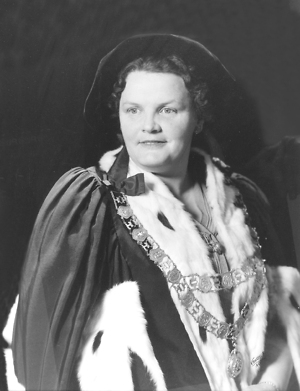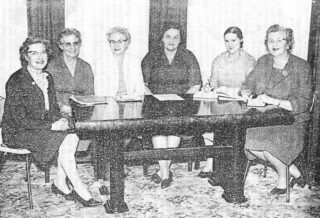- Entry type: Person
- Entry ID: AWE4926
Edwards, Dorothy Edna Annie
- OBE, CBE
- Maiden name Fleming, Dorothy Edna Annie

- Born 20 June 1907, Deloraine, Tasmania, Australia
- Died 9 March 2006, George Town, Tasmania, Australia
- Occupation Alderman, Community worker, Mayor, Women's rights activist, Women's rights organiser
Summary
Dorothy Edwards was the first Tasmanian woman to be elected president of the Australian National Council of Women. It is significant that Edwards’ base was in the Launceston branch of the NCW, for her election thus had implications for the status of the NCW of Tasmania, based in Hobart and acknowledged in the ANCW constitution as the official state Council. Edwards held office in the Launceston Council as secretary and president before election to the ANCW presidency 1960-1964. Her period in office was notable for her forthright engagement with government on issues such as equal pay and for her enthusiastic promotion of the International Council of Women’s new ‘twinning program’ and, in particular, for fostering close relations between the Australian Council and the Councils of Thailand, Fiji and Papua New Guinea. Her presidency also saw the holding of an ICW regional seminar on international understanding in Brisbane in 1964. She went on to serve in the ICW as convenor for finance, vice-treasurer and vice-president, and travelled overseas regularly to executive meetings and triennial conferences until 1996. She was made an honorary vice-president of both the Launceston and Australian Councils (1974 and 1973) and admitted to ICW’s Committee of Honour (1979).
Dorothy Edwards was also the first woman to be elected to the Launceston City Council. She served as an alderman for 15 years and was mayor 1955-1957, the first woman city mayor in Australia. She was subsequently admitted as an Honorary Freeman of the City of Launceston (1984). She was also awarded an OBE in 1958 and a CBE in 1979, and was entered on the Tasmanian Honour Roll of Women in 2005.
Details
Dorothy Edna Annie Edwards was born 20 June 1907, the daughter of Percival James Marshall Fleming and Edna Annie Rydale (née Best), in Deloraine, Tasmania, where her father was the town clerk. She was educated at Launceston High School, the University of Tasmania and the London School of Economics where she earned a Masters of Arts. Dorothy taught Latin and literature at Launceston High School for many years. A gifted teacher, she was remembered with respect, admiration and affection by many of her former students. She married Rex S.C. Edwards, a fellow teacher, on 20 May 1933 and had 2 sons. In keeping with the regulations of the time, she was forced to resign from the Education Department on her marriage, but, once her sons were at school, she found many other outlets for her talents and leadership qualities.
Dorothy Edwards was a remarkable individual who broke new ground for women in many areas and was an outstanding ambassador for the Council movement worldwide. She joined the revived National Council of Women of Launceston as secretary (1947-1956) and was active in the campaign to force the Launceston City Council to amend the Corporations Act to allow women to stand for election as aldermen. Edwards had a long-standing interest in local government given her father’s career as a council clerk. The Corporations Act was amended in 1945 and, in December 1949, she became the first woman not only to seek election for the Launceston City Council, but also to be elected. Edwards served as an alderman for 15 years and was mayor from December 1955 to December 1957, the first female city mayor in Australia. She counted among her achievements the building of the City Baths at Windmill Hill, flood prevention measures and the opening of a by-products plant for the Killafaddy Abattoirs.
Dorothy Edwards’ contribution to the National Council of Women was significant at the local, national and international levels. In addition to her contribution as secretary to the Launceston NCW for nearly a decade, she was president from 1958 to 1960. She went on to become the first Tasmanian president of the ANCW, serving in that role from 1960 to 1964. Although Hobart’s Emily Dobson had played a crucial role in founding state Councils and encouraging interaction between them, and though she led, and therefore was president of, Australian delegations to the ICW up to 1921, she was never president of the Federal Council or ANCW. It is significant that Edwards’ base was in the Launceston branch of the NCW, which, though recognised as an autonomous Council in 1946, was not a state Council. Since her presidential base was Launceston, her election gave credence to the view that Launceston NCW was equivalent in status to NCW Tasmania, based in Hobart, and thus helped perpetuate the stand-off over the constitutional position of the 2 Tasmanian branches. Only one member of NCWT, Vee Couche, served (as treasurer) on Edwards’ board, albeit briefly. Rivalry between the Tasmanian Councils festered for the rest of the century with serious repercussions. It is, however, indisputable that Launceston was a more vibrant Council than NCWT at the time of Edwards’ ANCW presidency and that she was a particularly forceful, influential and innovative national leader. She showed considerable initiative in ensuring the financial viability of her board and funding the extensive regime of travel she undertook to all states by arranging for the Launceston City Council to cater for an International Rotary Conference held in Launceston and organising 3 public exhibitions.
Edwards’ period in office was notable for her enthusiastic promotion of the ICW’s new ‘twinning program’ and, in particular, for fostering close relations between the Australian Council and the Councils of Thailand, Fiji and Papua New Guinea. She arranged for visits to Australia by the president of Thailand’s NCW, Princess Prem Purachatra, in 1962, and later helped finalise the twinning relationship with Thailand in 1967. She also persuaded the administrator of PNG to consent to 2 New Guinea representatives attending the 1962 and 1963 ANCW conferences, and gained Australian government financial assistance to bring 2 PNG women, 2 Northern Territory Aboriginal women and representatives of 7 Asian nations to the ICW regional seminar on international understanding in Brisbane in 1964. After the 1963 ICW conference, she expressed the view that ‘our work over the next Decade [designated by the UN the Decade of Development] should be largely that of increasing our International contacts, particularly with the new Councils, which are anxious to participate fully in I.C.W. . . The future of millions of people may depend on the relationships we establish now’. The focus of the 1964 regional seminar was ‘the responsibility of woman to herself, her home, her community and mankind, as seen by people of different cultures’.
With regard to Australian issues, Edwards pulled no punches, attempting to jolt the Councils into more activist pursuit of their objectives as distinct from just paying lipservice to them with the same or similar resolutions passed year after year. ‘I often doubt’, she said, ‘if even our own members are really behind us’. They needed to ensure that goals such as equal pay and the lifting of the marriage bar in the public service had ‘a large informed body of public support behind them’, and they should start this work with their own affiliated societies. Edwards’ frustration on the issue of equal pay, for example, was evident in her response to the Liberal Party women senators’ failure to vote for a Labor Party amendment to the Public Service Bill to provide for equal remuneration within the Commonwealth Public Service. In 1961, her board wrote a letter of protest to the 4 senators (3 of whom had close ANCW connections) sharply reminding them that had they voted for Senator Willesee’s motion it would have been carried. The letter concluded: ‘This protest is in conformity with ANCW’s policy on equal pay for women’. Edwards clearly believed the outcome would have been different if the senators had felt the pressure of public opinion.
In line with these views, Edwards made concerted attempts to expand the Australian Council movement, arguing that it was time to go beyond the previous emphasis on consolidation and unity, and noting the formation of a Townsville branch in Queensland as well as the successful extension into large country towns in Victoria to make NCWV a truly state-wide organisation. ANCW itself had now helped establish a provisional Council in Darwin and Edwards requested support from the state Councils to sustain it. She also suggested speeding up decision-making by giving more power to state Councils’ officers or to the ANCW board and using modern forms of communication to disseminate information more effectively. Encouraging individual associate membership might help rejuvenate debate and bring in new talent, and choosing convenors of standing committees on the basis of merit rather than state representation might increase efficiency and initiative. More systematic and routine communication between state, national and international convenors was necessary for the committee system to operate smoothly. The extent to which these aims were achievable in a volunteer organisation was another matter but Edwards’ board was certainly a very well-oiled operation and its records were meticulously kept. She was appointed a life vice-president of the National Council of Women of Australia in 1973.
At the 1963 triennial ICW conference in Washington, Edwards was elected vice-treasurer (1963-1970) and vice president (1963-1979) of the International Council of Women, as well as convenor of the Finance Committee. After relinquishing the ANCW presidency in 1964, Edwards made ICW work the centre of her continuing Council activity. She was appointed to the ICW Committee of Honour in 1979. Her attendance at ICW conferences and executive meetings extended from 1963 to 1996, and, like her Tasmanian exemplar, Emily Dobson, she rarely missed one of these gatherings.
Dorothy Edwards worked actively with many other organisations for extended periods before and after her retirement from Launceston City Council. She was a member of the ABC Board (1962-1975); the State Library Board (1953-1978); the Decimal Currency Committee (1959-1960); the Queen Victoria Hospital Board (1958); the Tasmanian Orchestra Advisory Committee (1953-1954); vice-warden of Convocation at the University of Tasmania (1963-1965) and chairman of the Interim Board of the Launceston General Hospital (1971-1972). She was also a member of the Women Graduates’ Association and the Business and Professional Women’s Club, and was president of the Launceston branch of the United Nations Association of Australia (1967-1979).
Dorothy Edwards was awarded an OBE in 1958 and a CBE in 1979. She was admitted as an honorary freeman of the City of Launceston in 1984 and was entered on the Tasmanian Honour Roll of Women in 2005 in recognition and acknowledgment of her distinguished service to Tasmania through her long association with local government, community and cultural organisations. Her distinguished service, wisdom and leadership over nearly 60 years in so many areas of community life was legendary and so was her capacity for open, warm and forthright interpersonal relations. She eschewed false modesty and any pretension, and, unlike most of her predecessors in the Council movement, openly enjoyed a cigarette and a glass of sherry or whisky with friends and colleagues.
Events
-
1963 - 1979
International Council of Women
Vice-president -
1963 - 1970
International Council of Women
Vice-treasurer -
1958 - 1960
National Council of Women of Launceston
Presided
Archival resources
Digital resources
Published resources
-
Site Exhibition
- Faith, Hope and Charity Australian Women and Imperial Honours: 1901-1989, Australian Women's Archives Project, 2003, http://www.womenaustralia.info/exhib/honours/honours.html
- Stirrers with Style! Presidents of the National Council of Women of Australia and its predecessors, National Council of Women of Australia, 2013, http://www.womenaustralia.info/exhib/ncwa
-
Resource
- Trove: Edwards, Dorothy Edna Annie (19070620-20060309), http://nla.gov.au/nla.party-1665902
- Edited Book
- Report
-
Resource Section
- Dorothy Edna Annie Edwards CBE, Tasmanian Government, c.2006, http://www.dpac.tas.gov.au/divisions/cdd/programs_and_services/tasmanian_honour_roll_of_women/inductees/2005/dorothy_edna_annie_edwards_cbe
Related entries
-
Board Member
-
Presided
-
Member
-
Related Organisations
-
Related Women
-
Related Concepts
